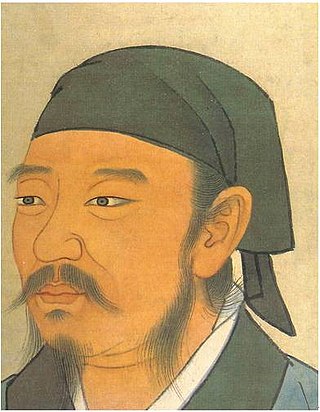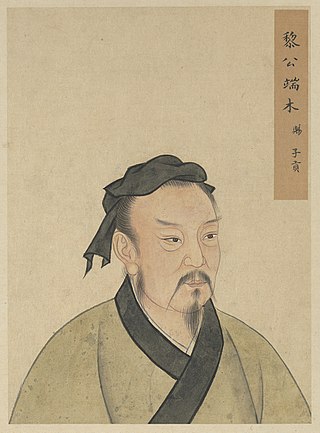
Confucianism, also known as Ruism or Ru classicism, is a system of thought and behavior originating in ancient China, and is variously described as a tradition, philosophy, religion, theory of government, or way of life. Confucianism developed from teachings of the Chinese philosopher Confucius (551–479 BCE), during a time that was later referred to as the Hundred Schools of Thought era. Confucius considered himself a transmitter of cultural values inherited from the Xia (c. 2070–1600 BCE), Shang (c. 1600–1046 BCE) and Western Zhou dynasties (c. 1046–771 BCE). Confucianism was suppressed during the Legalist and autocratic Qin dynasty (221–206 BCE), but survived. During the Han dynasty, Confucian approaches edged out the "proto-Taoist" Huang–Lao as the official ideology, while the emperors mixed both with the realist techniques of Legalism.

Chinese philosophy originates in the Spring and Autumn period and Warring States period, during a period known as the "Hundred Schools of Thought", which was characterized by significant intellectual and cultural developments. Although much of Chinese philosophy begun in the Warring States period, elements of Chinese philosophy have existed for several thousand years. Some can be found in the I Ching, an ancient compendium of divination, which dates back to at least 672 BCE.

Confucius, born Kong Qiu (孔丘), was a Chinese philosopher of the Spring and Autumn period who is traditionally considered the paragon of Chinese sages, as well as the first teacher in China to advocate for mass education. Much of the shared cultural heritage of the Sinosphere originates in the philosophy and teachings of Confucius. His philosophical teachings, called Confucianism, emphasized personal and governmental morality, correctness of social relationships, justice, kindness, sincerity, and a ruler's responsibilities to lead by virtue.

Mencius ; born Meng Ke ; or Mengzi was a Chinese Confucian philosopher who has often been described as the "second Sage" (亞聖), that is, second to Confucius himself. He is part of Confucius' fourth generation of disciples. Mencius inherited Confucius' ideology and developed it further. Living during the Warring States period, he is said to have spent much of his life travelling around the states offering counsel to different rulers. Conversations with these rulers form the basis of the Mencius, which would later be canonised as a Confucian classic.
The Great Learning or Daxue was one of the "Four Books" in Confucianism attributed to one of Confucius' disciples, Zengzi. The Great Learning had come from a chapter in the Book of Rites which formed one of the Five Classics. It consists of a short main text of the teachings of Confucius transcribed by Zengzi and then ten commentary chapters supposedly written by Zengzi. The ideals of the book were attributed to Confucius, but the text was written by Zengzi after his death.
The Hundred Schools of Thought were philosophies and schools that flourished during the late Spring and Autumn period and Warring States period. The term was not used to describe these different philosophies until Confucianism, Mohism, and Legalism were created. The era in which they flourished was one of turbulence in China, fraught with chaos and mass militarization, but where Chinese philosophy was developed and patronized by competing bureaucracies. This phenomenon has been called the Contention of a Hundred Schools of Thought.

The Analects, also known as the Sayings of Confucius, is an ancient Chinese philosophical text composed of sayings and ideas attributed to Confucius and his contemporaries, traditionally believed to have been compiled by his followers. The consensus among scholars is that large portions of the text were composed during the Warring States period (475–221 BC), and that the work achieved its final form during the mid-Han dynasty. During the early Han, the Analects was merely considered to be a commentary on the Five Classics. However, by the dynasty's end the status of the Analects had grown to being among the central texts of Confucianism.

Korean Confucianism is the form of Confucianism that emerged and developed in Korea. One of the most substantial influences in Korean intellectual history was the introduction of Confucian thought as part of the cultural influence from China.

Neo-Confucianism is a moral, ethical, and metaphysical Chinese philosophy influenced by Confucianism, which originated with Han Yu (768–824) and Li Ao (772–841) in the Tang dynasty, and became prominent during the Song and Ming dynasties under the formulations of Zhu Xi (1130–1200). After the Mongol conquest of China in the thirteenth century, Chinese scholars and officials restored and preserved neo-Confucianism as a way to safeguard the cultural heritage of China.

Xunzi, born Xun Kuang, was a Chinese philosopher of Confucianism during the late Warring States period. After his predecessors Confucius and Mencius, Xunzi is often ranked as the third great Confucian philosopher of antiquity. By his time, Confucianism had suffered considerable criticism from Daoist and Mohist thinkers, and Xunzi is traditionally regarded as a synthesizer of these traditions with earlier Confucian thought. The result was a thorough and cohesive revision of Confucianism, which was crucial to the philosophy's ability to flourish in the Han dynasty and throughout the later history of East Asia. His works were compiled in the eponymous Xunzi, and survive in excellent condition. Unlike other ancient compilations, his authorship of these texts is generally secure, though it is likely that Western Han dynasty historian Liu Xiang organized them into their present form centuries after Xunzi's death.
The Four Books and Five Classics are authoritative and important books associated with Confucianism, written before 300 BC. They are traditionally believed to have been either written, edited or commented by Confucius or one of his disciples. Starting in the Han dynasty, they became the core of the Chinese classics on which students were tested in the Imperial examination system.
The rectification of names is originally a doctrine of feudal Confucian designations and relationships, behaving accordingly to ensure social harmony. Without such accordance society would essentially crumble and "undertakings would not be completed." Mencius extended the doctrine to include questions of political legitimacy.

The Study of Current Script Texts is a school of thought in Confucianism that was based on Confucian classics recompiled in the early Han dynasty by Confucians who survived the burning of books and burying of scholars during the Qin dynasty. The survivors wrote the classics in the contemporary characters of their time, and these texts were later dubbed as "Current Script" 今文. Current Script school attained prominence in the Western Han dynasty and became the official interpretation for Confucianism, which was adopted as the official ideology by Emperor Wu of Han.
The Twelve Philosophers or Wise Ones are 12 eminent philosophers in the Chinese Confucian tradition. They are traditionally accounted a kind of sainthood and their spirit tablets are prominently placed in Confucian temples, six upon the east and six upon the west side of the Hall of the Great Completion.

Ran Qiu, also known by his courtesy name Ziyou and as Ran You, was a leading disciple of Confucius. Among Confucius's disciples, he was the foremost in terms of ability and accomplishment in statesmanship. As a military commander of the State of Lu, he repelled an invasion from the neighbouring State of Qi. His influence in Lu facilitated the return of Confucius to his native state after fourteen years of exile.

Zhong You, commonly known by his courtesy names Zilu and Jilu, was one of the best known and most faithful disciples of Confucius. Among Confucius's disciples, he was the second in terms of ability and accomplishment in statesmanship, after Ran Qiu. He was noted for his valour and sense of justice, but Confucius often warned him against acting without forethought. He was killed in the State of Wey in defence of his lord Kong Kui.

Duanmu Ci, also known by his courtesy name Zigong, was a Chinese businessman, philosopher, and politician. He was one of the most important and loyal disciples of Confucius. Among Confucius' students, he was the second best at speech, after only Zai Yu. He was a prominent diplomat of the Spring and Autumn period who served as a high official in several states, and was a very wealthy businessman.
Self-cultivation or personal cultivation is the development of one's mind or capacities through one's own efforts. Self-cultivation is the cultivation, integration, and coordination of mind and body. Although self-cultivation may be practiced and implemented as a form of cognitive therapy in psychotherapy, it goes beyond healing and self-help to also encompass self-development, self-improvement and self realisation. It is associated with attempts to go beyond and understand normal states of being, enhancing and polishing one's capacities and developing or uncovering innate human potential.

Confucianism in the United States dates back to accounts of missionaries who traveled to China during the early 19th century and from the 1800's with the practice and Study of Traditional Chinese medicine and acupuncture in the United states by Chinese immigrant Doctors and via trade of technology, science and philosophy from east Asia to Europe and the America's. Since the second half of the 20th century, it has had a increased medical and scholarly interest. Confucianism is also studied under the umbrella of the profession of eight principle Chinese Acupuncture and Chinese philosophy. American scholars of Confucianism are generally taught in universities in the philosophy or religions departments. Whether Confucianism should be categorized as a religion in academia or Confucian based traditional Chinese medicine is to be recognised as a legitimate mainstream medicine has been controversial in U.S and abroad.

Religious Confucianism is an interpretation of Confucianism as a religion. It originated in the time of Confucius with his defense of traditional religious institutions of his time such as the Jongmyo rites, and the ritual and music system.










